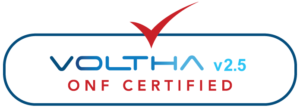ONF is pleased to announce the release of VOLTHA 2.5. This release features a number of improvements, new features, workflow support and tests, while also having dedicated time to a series of very important design discussions, laying the foundation for LTS releases in the future.
Noteworthy elements of the 2.5 release include:
- BBSim support for Turk Telecom workflow used for development and scale testing
- Logging collection through an EFK (ElasticSearch, Fluentd, Kibada) stack and correlation through Jaeger
- OpenOnu Go implemented support for DT and AT&T workflows and container restart.
- Device management interface release
- Code security and OMCC channel encryption.
- ONOS improvements
- Meter store
- Trap flows in the apps
- Helm chart liveliness and readiness probes and openflow port exposure.
- BAL 3.4.7.5 including the downstream bandwidth limiting bugfix
- Testing
- New tests (OLT Enable/Disable, ONOS HA)
- Soak testing
- Load measurement

For the VOLTHA v2.5 release, the following hardware targets have been certified by ONF’s Continuous Certification Program:
- Edgecore ASXvOLT16
- Edgecore ASGvOLT64
- Edgecore AS5712-54x
- Edgecore AS6712-54x
- Sercomm FG1000
VOLTHA 2.5 Release Details
After the successful completion of MVP 1.0 requirements in the last release (VOLTHA 2.4 - end of July), this release of VOLTHA 2.5, together with ONOS 2.2.6, features several bug fixes as well as progress towards meeting MVP 2.0 requirements. In particular, an OLT software component (BAL from Broadcom) was upgraded to v3.4.7.5 which fixed a critical bug in downstream bandwidth limiting.
The Turk Telekom (TT) workflow was fully incorporated in the PON simulator BBSim so that the latter can be used for development but more importantly deployed in scale tests similar to the ones for AT&T and DT workflows in the nightly scale testing jobs. The current target for the TT workflow is 1 OLT with 512 ONUs. The scale jobs are also used to measure system load, important for server-sizing.
Along with scale testing VOLTHA 2.5 bring an OLT enable/disable test and an ONOS HA test, where the master instance controlling the VOLTHA device is torn down, forcing mastership change and ensuring that state for all of the elements managed by ONOS is properly kept while no disruption happens in the dataplane. A soak test is also set up, to ensure stability over a long period of time.
The VOLTHA logging infrastructure was enhanced by employing Jaeger for log correlation across services, thus offering the capability to trace a call across all the VOLTHA components, a useful tool for troubleshooting in many scenarios. VOLTHA 2.5 also includes the capability to deploy and then import the logs in an EFK stack (Elasticsearch, Fluentd and Kibana) for persistence and analysis. In addition, the openolt agent has been enhanced to export the logs to the EFK stack.
As part of a multi-release effort to increase security of the system we introduced the capability to encrypt the OMCC GEM channel for OMCI communication. Static code checks were also added to the build check of many of the services when a patch is submitted, thus ensuring quality of the code. Few pre-existing sca issues were fixed before turning on mandatory checks.
In parallel, the Device Management Interface brigade made its first release of the interface, with capabilities including device software upgrade, metrics and alarms, hardware component (fans, LEDs etc.) management and inventory.
While still not used as the default onu adapter, the GoLang based ONU adapter in VOLTHA continued to make progress with preliminary support for the DT and AT&T workflows, supporting flow and meter programming. Tests through the scale pipeline are already showing remarkable performance improvements over the python version, with one adapter supporting 1000 ONUs.
Finally, while not part of the release, design discussions were completed on a number of issues that are part of the MVP 2.0 requirements. In particular the team focused on the distinction between OLT reboot and OLT agent disconnect, ONU and VOLTHA/ONOS stack software upgrades, Error handling, Mac-learner app, gRPC channel encryption and flow replication to the OLT agent. We expect the implementation of such design decisions will be completed in the next release.
We would like to thank everyone in the VOLTHA community, which includes many companies all over the world who have worked hard to achieve this substantial milestone.
Please see the complete release notes here to see a full list of new features and enhancements.

